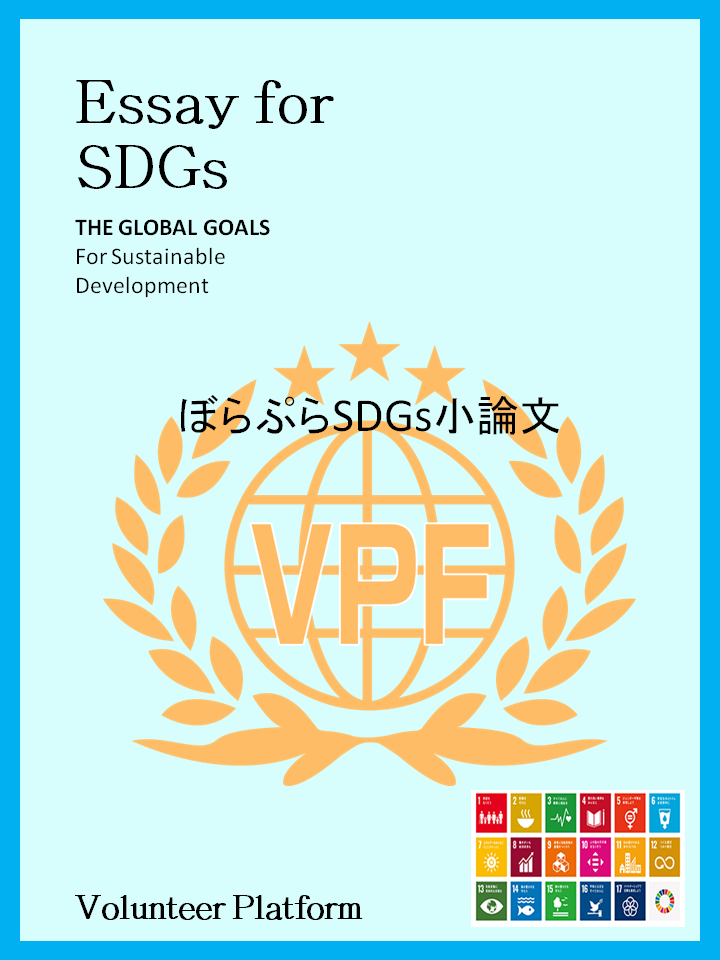[ぼらぷらSDGs小論文]

『The Impact of Individual Actions on the SDGs』
小論文
『The Impact of Individual Actions on the SDGs』
The Sustainable Development Goals SDGs are a set of 17 global objectives established by the United Nations in 2015, aimed at addressing various social, economic, and environmental challenges by 2030. These goals include eliminating poverty, promoting gender equality, ensuring clean water and sanitation, and taking urgent action against climate change. As global citizens, our actions, no matter how small, are important in contributing to the achievement of these goals. However, there is a problem in that the level of commitment to the SDGs varies among individuals. It is true that individual actions lead to achieving the SDG goals.There is some reasons why individual actions are important.
First,raising awareness and personal responsibility. Individuals need to understand that their everyday actions can have global impacts. For instance, SDG 12 focuses on responsible consumption and production. By being mindful of our consumption patterns such as reducing waste, recycling, and choosing sustainable products,we can contribute to a more sustainable world. Household waste consitutes a large percentage of general waste. Simple actions like avoiding single use plastics and using reusable alternatives can improve the environment.Additionally, being mindful of energy and water consumption at home, such as using energy efficient appliances and not draining oil from the kitchen, supports SDG 7 Affordable and Clean Energy and SDG 6 Clean Water and Sanitation. When individuals adopt sustainable practices, they set an example for others.
Second,community engagement and volunteering.Community engagement and volunteering are powerful tools in addressing various SDGs. For example, SDG 1 aims to end poverty in all its forms. Volunteering with local organizations that support disadvantaged communities helps provide essential services and support systems for those in need. The World Bank 2018 indicates that the community based interventions have significantly reduced poverty levels in several regions. Participating in local initiatives such as food drives, homeless shelters, and educational support programs can directly impact individuals and families struggling with poverty. Furthermore, volunteering for environmental causes such as community clean up drives, tree planting activities, and conservation projects aligns with SDGs 13 Climate Action and 14 Life Below Water. These activities improve the local environment and raise awareness, encouraging others to take part. Community engagement inspires more people to contribute to the SDGs.
Finally,support and policy influence.support and influencing policy are important for making lasting changes, which are needed for the longterm success of the SDGs. By staying informed about policies at all levels, people can discuss and push for the changes needed.For instance, SDG 10 focuses on reducing inequalities. Policies that support social and economic inclusion help create a fairer society.
Research by the International Institute for Environment and Development 2019 shows that advocacy campaigns have led to significant policy shifts in areas such as climate action and gender equality. Engaging in advocacy involves writing to elected officials, participating in public forums, and using social media platforms to raise awareness and support for SDG related policies. Supporting non governmental organizations NGOs and Grassroots movements working for policy change strengthen these efforts.For example, advocating for policies that promote renewable energy sources contributes to SDG 7 Affordable and Clean Energy and SDG 13 Climate Action. Supporting policies that ensure equal access to education,health care and economic opportunities helps reduce inequalities and promotes fairness. Voting for leaders who focus on sustainable development and fair policies can bring about important changes that match the SDGs. Advocacy helps shape policies and also educates and encourages others to get involved.
The SDGs are a big plan to tackle some of the world’s biggest problems. Although they might seem challenging, everyone’s actions are important for making them happen. By spreading awareness, helping out in the community, volunteering, and pushing for better policies, we can all contribute to a fairer and more sustainable world. Every little effort helps us get closer to a brighter future for everyone.It's not just our job but also a chance to make a real difference, making sure future generations get a world where everyone can succeed.





 LINE相談
LINE相談
